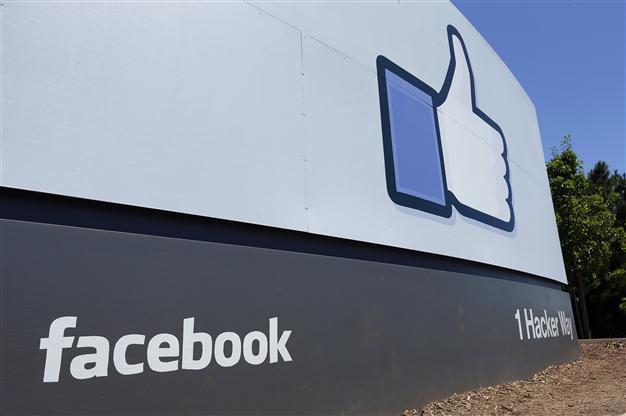Kurdish politicians to take action after Facebook admits to banning pages with PKK content
ISTANBUL

This July 16, 2013 FILE photo, shows a sign at Facebook headquarters in Menlo Park, Calif. Government agents in 74 countries demanded information on about 38,000 Facebook users in the first half of this year, with about half the orders coming from authorities in the United States, the company said Tuesday. AP Photo/Ben Margot, File
Turkey’s Peace and Democracy Party (BDP) vowed on Aug. 29 to start legal action against Facebook after the social networking website’s European director said they banned pages belonging to Kurdish politicians and groups that praise the outlawed Kurdistan Workers’ Party (PKK).The BDP deputy co-chair, Meral Danış Beştaş, said international bodies must take action against the closure of Kurdish groups’ Facebook pages, adding that Facebook had not made any statement over the closure of their party’s or deputies’ pages, daily Radikal reported.
“The ability to exercise freedom of speech must be broadened. The international mechanisms must take action. We will make our applications in this respect. We will make applications on the ground that this decision is unlawful, unacceptable and must be removed immediately,” said Beştaş.
“This is a completely political approach. ... There are plenty of Facebook and Twitter accounts which praise racism and hate speech. But this is not a reason for their closure,” Beştaş said.
Facebook’s director of Facebook Policy in Europe, Richard Allen, has admitted that the popular social networking site actively bans pages belonging to Kurdish politicians or groups that allegedly praise the PKK.
Allan said it was forbidden for users to praise or use the logos of organizations listed as illegal by the European Union and the United States including the PKK, which has been fighting against the Turkish army for nearly three decades, according to a report by daily Radikal.
Allan said the same rule applied to the Irish Republican Army (IRA).
Peace and Democracy Party (BDP) deputy Hasip Kaplan’s personal account on Facebook was also banned yesterday, daily Hürriyet reported.
“This is scandalous; our lawyers are looking into it. We will sue Facebook,” he reportedly said. Kaplan said he was sharing his speeches on his account and pictures from his party’s meetings.
“Facebook shut down my page alleging that terror organization symbol and flags were posted. The ruling Justice and Development Party (AKP) page has Hamas’ leader’s photographs and so on, they must ban it as well then; this is a dirty coalition [between the government and Facebook],” he said.
More than 10 pages were shut down between July 6 and Aug. 12 by Facebook, most of which belonged to nationally known Kurdish politicians. In addition, pages belonging to Ötekilerin Postası (The Others’ Post), which defines itself as a minority rights’ alternative news source, were also closed down. Kurdi Muzik (Kurdish Music) and Yeni Özgür Politika (New Free Policy), which focuses on Kurdish politics, were also banned.
Allan said the pages were banned on the basis of reports from users and because Facebook standards prohibit any content that allegedly praises terrorist organizations.
“Praising a person or a group on an international terror list violates our rules. Bearing those organizations’ icons, flag, symbols and the like is also against our rules. For instance, praising the IRA in England, FARC in Colombia, ETA in Spain, the PKK in Turkey or using their symbols is against our rules,” Allan was quoted saying by the daily.
Allan also said Facebook would ban Irish political party Sinn Fein’s page if it shared any content related to the IRA given that the group is on an international terror list.
But Allan said an anti-campaign from other users to ban a page they dislike was not reason enough for Facebook to ban that page.
“If the content [on such a page] accords with our rules, we won’t touch that page, even if that page was reported a thousand times,” he said.
Meanwhile, the director said information about 47 users that Facebook shared with Turkish police was not connected to political issues but was focused rather on child abuse and violence.
Data released by Facebook on Aug. 26 showed that authorities in Turkey submitted 96 information requests covering 173 users and that Facebook provided information in about 45 of those cases.
















